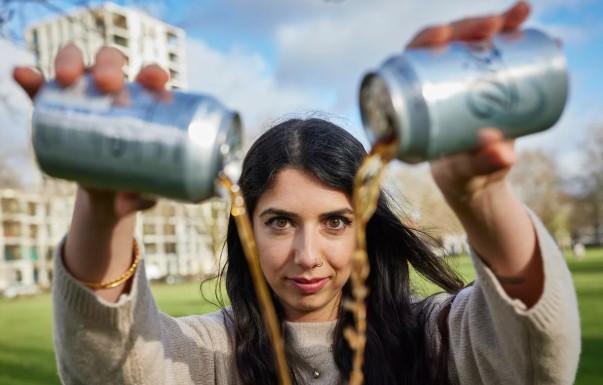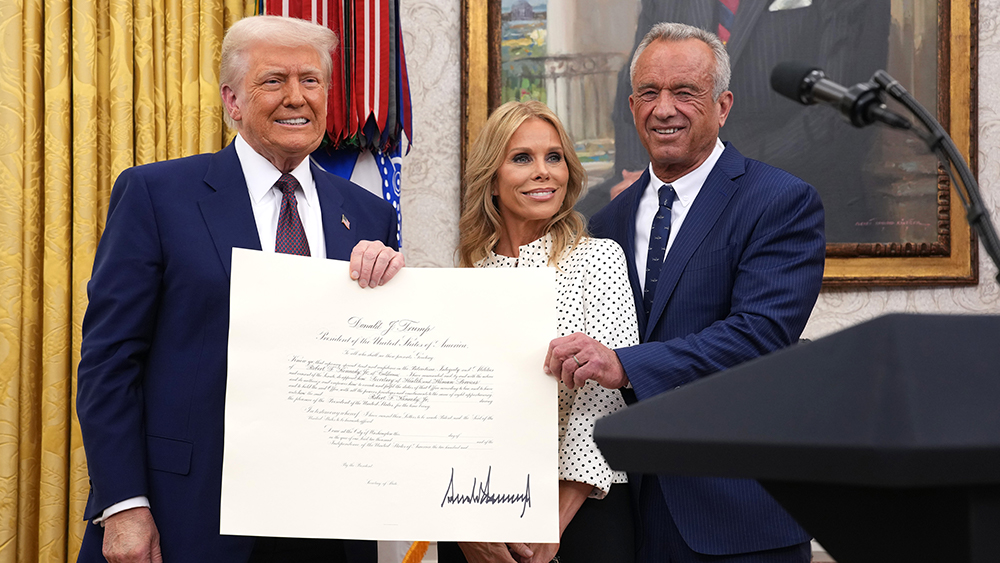The hidden key to calm: How modern life is sabotaging your brain’s “off switch”—and how to fix it
09/10/2025 / By Willow Tohi

- The brain’s primary inhibitory neurotransmitter, GABA, regulates stress, anxiety and sleep—but modern life disrupts its balance through chronic stress, trauma and poor diet.
- Fermented foods (kimchi, kefir) and probiotics (Bifidobacterium, Lactobacillus) support GABA production by nurturing gut bacteria linked to neurotransmitter synthesis.
- Magnesium-rich foods (spinach, almonds), glutamate sources (broccoli, brown rice) and omega-3s (fish, flaxseeds) provide raw materials for GABA production.
- Mindfulness practices (meditation, yoga, breathwork) rewire the brain via neuroplasticity, enhancing GABA activity and reducing stress responses.
- Processed foods, alcohol and drugs temporarily spike GABA but deplete long-term production, worsening anxiety and insomnia.
On a cellular level, the modern world is rewiring our brains for exhaustion. Gamma-aminobutyric acid (GABA)—the neurotransmitter responsible for slowing nerve activity, easing anxiety and deepening sleep—is under siege. Chronic stress, processed diets and trauma are shrinking GABA production, leaving millions trapped in a state of perpetual “fight or flight.” Yet unlike prescription sedatives, which artificially boost GABA with risky side effects, emerging research reveals how diet, gut health and mindfulness can restore this natural tranquilizer—without drugs.
The stakes are high. Low GABA levels are linked to anxiety disorders, insomnia and even epilepsy. “GABA is a reflection of our rest, rhythm and regulation,” said Mpho Tshukudu, a functional nutritionist, in an interview with The Epoch Times. “When it’s depleted, the brain loses its ability to quiet down.” The culprits? A trifecta of modern scourges: chronic stress (which shrinks GABA-producing neurons), gut dysbiosis (where imbalanced microbiota starve the brain of calming signals) and nutrient deficiencies (magnesium, glutamate and omega-3s are critical cofactors for GABA synthesis).
Historically, humans evolved with natural GABA boosters—fermented foods, unprocessed grains and sunlight-regulated circadian rhythms. Today, ultra-processed diets and 24/7 digital stimulation have severed that balance. “The brain’s stress circuits are stuck ‘on,’” explained Dr. Priyal Modi, an integrative medicine practitioner. “High cortisol doesn’t just deplete GABA; it makes the brain less sensitive to the GABA that’s left.”
The gut-brain GABA factory: How fermented foods and fiber rewrite your mood
The gut doesn’t just digest food—it manufactures calm. Up to 90% of serotonin (a precursor to GABA) is produced in the gastrointestinal tract, and emerging research shows that gut bacteria like Bifidobacterium and Lactobacillus directly synthesize GABA. A 2021 study in Nutrients found that diets rich in prebiotics (garlic, onions, asparagus) and fermented foods (kimchi, kefir, sauerkraut) increased GABA activity in the brain’s cortex and hippocampus—regions critical for emotional regulation.
“The gut microbiota are like a second brain,” said Jodi Duval, a naturopathic physician. “They don’t just influence GABA production; they determine how effectively your brain uses it.” Animal studies confirm this: Mice fed prebiotics showed higher GABA levels and lower anxiety behaviors than controls. For humans, the prescription is clear:
- Eat the rainbow: Polyphenol-rich foods (blueberries, dark chocolate) feed GABA-producing bacteria.
- Prioritize fiber: Aim for 30+ grams daily from vegetables, legumes and whole grains.
- Embrace fermentation: A daily serving of kimchi or kefir may outperform probiotic pills.
Yet the Standard American Diet (SAD) does the opposite. “Processed foods starve the gut of diversity,” Duval warned. “When you eat artificial sweeteners or fried foods, you’re feeding pathogens that compete with GABA producers.”
From spinach to sunlight: The science-backed toolkit for GABA repair
GABA isn’t just about what you avoid—it’s about what you actively nourish. Clinical trials and neuroscience studies highlight five evidence-based strategies:
- Magnesium: The mineral mirror for GABA
- Why it works: Magnesium activates GABA receptors. A 2017 study in Nutrients found that magnesium deficiency reduced GABA synthesis by 30% in animal models.
- Best sources: Spinach, pumpkin seeds, dark chocolate (70%+ cocoa) and Epsom salt baths.
- Glutamate-rich foods: The building blocks
- Why it works: GABA is synthesized from glutamate, an amino acid abundant in broccoli, brown rice and sweet potatoes.
- Caution: Avoid MSG and processed glutamates, which overstimulate nerves and deplete GABA.
- Herbal allies: Nature’s benzodiazepines
- Valerian root, passionflower and lemon balm bind to GABA receptors, mimicking pharmaceutical sedatives—but without addiction risks. A 2021 Nutrients review confirmed their efficacy for insomnia.
- Movement as medicine
- Yoga and tai chi increase GABA by up to 27%, per a 2010 Journal of Alternative and Complementary Medicine study. Even a 30-minute walk lowers cortisol, preserving GABA.
- The neuroplasticity hack: Breathwork and meditation
- “GABA balance is trainable,” Modi emphasized. Harvard research shows that 8 weeks of meditation thickens the prefrontal cortex (the brain’s “brake pedal”) and boosts GABA by 20%.
- Try this: 4-7-8 breathing (inhale 4 sec, hold 7 sec, exhale 8 sec) to stimulate the vagus nerve, which regulates GABA.
The GABA saboteurs: What’s draining your calm (and how to stop it)
Not all GABA depletion is accidental. Alcohol, benzodiazepines and even junk food create a vicious cycle:
- Alcohol temporarily spikes GABA but downregulates receptors, requiring more to achieve the same effect—a hallmark of addiction.
- Sugar and refined carbs trigger insulin spikes that disrupt glutamate-GABA conversion.
- Chronic screen time (especially before bed) suppresses melatonin, which synergizes with GABA for deep sleep.
“The body becomes dependent on external GABA boosts,” Tshukudu said. “But the brain is designed to make its own—if we give it the right tools.”
Why GABA matters more than ever
In an era of burnout epidemics, sleep crises and pharmaceutical overreliance, GABA offers a radical proposition: Calm is not a pill—it’s a practice. The solutions—fermented foods, magnesium-rich meals, sunlight and breath—are ancient, but their mechanisms are now validated by cutting-edge neuroscience.
The choice is stark. “You can either outsource your calm to drugs that eventually stop working,” Modi said, “or you can rebuild your brain’s innate capacity for peace.” The latter requires patience. GABA levels don’t rebound overnight. But unlike pharmaceuticals, the benefits compound: better sleep, sharper focus, resilient moods and a nervous system that remembers how to rest.
For a culture hooked on quick fixes, that’s a revolution worth waiting for.
The quiet revolution: Reclaiming your brain’s right to rest
The GABA crisis is a microcosm of modern disconnection—from our food, our rhythms and our bodies’ wisdom. Yet the remedy lies not in a lab, but in the kitchen, the garden and the breath. As Tshukudu put it: “GABA isn’t just a neurotransmitter. It’s proof that the body knows how to heal—if we let it.” The question is no longer if we can restore balance, but when we’ll choose to begin.
Sources for this article include:
Submit a correction >>
Tagged Under:
brain function, brain health, Censored Science, Cures, fitness, GABA, mind body science, modern life, natural health, natural medicine, natural remdies, nutrients, prevention, remedies, research, sleep, stress remedies
This article may contain statements that reflect the opinion of the author





















